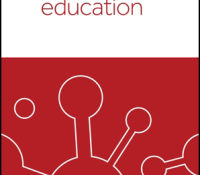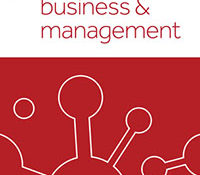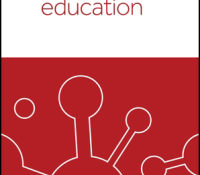tandfonline.com har udgivet en rapport under søgningen “Teacher Education Mathematics”: The relationship between EFL teachers’ continuing professional development and their self-efficacy: A structural equation modeling approach Link til kilde
Like this:
Like Loading...
tandfonline.com har udgivet en rapport under søgningen “Teacher Education Mathematics”: Abstract Formulae display:?Mathematical formulae have been encoded as MathML and are displayed in this HTML version using MathJax in order to improve their display. Uncheck the box to turn MathJax off. This feature requires Javascript. Click on a formula to zoom. Abstract A new twenty-first century skills framework and a 19-item scale was developed to bridge the gap between science and practice. A self-reporting 19-item scale was developed to measure twenty-first century skills of faculty and non-faculty staff of agri varsities. A total of 49 items were generated using deduction approach for four skills: communication and collaboration, leadership and responsibility, problem-solving and decision-making, and creativity and innovation. Two content validity techniques were used that reduced the number of items to… Continue Reading →
Like this:
Like Loading...
tandfonline.com har udgivet en rapport under søgningen “Teacher Education Mathematics”: Development of a predictive tool for rapid assessment of soil total nitrogen in wheat-corn double cropping system with hyperspectral data Link til kilde
Like this:
Like Loading...
eric.ed.gov har udgivet: To extend current understanding of school-based agriculture teacher development, this study explored the relationship between teacher development experiences and the self-efficacy of early career agriculture teachers. Three teacher development experiences were of interest: (a) preservice coursework, (b) student teaching, and (c) professional development. Teacher development experiences were analyzed in relation to classroom management self-efficacy, instructional strategies self-efficacy, leadership self-efficacy, science teaching self-efficacy, and math teaching self-efficacy. The relationships between development experiences and self-efficacy were analyzed through five linear regressions with teacher development experiences as independent variables and the five areas of self-efficacy as separate dependent variables. Only statistically insignificant relationships were identified for classroom management self-efficacy and instructional strategies self-efficacy. Student teaching and professional development were statistically significant, positive predictors of leadership self-efficacy. Professional development was also… Continue Reading →
Like this:
Like Loading...
eric.ed.gov har udgivet: Many people feel mathematics education in the U.S. is in need of improvement. Fennema and Franke (1992) note that teachers’ knowledge (or lack thereof) is often associated with poor instruction and thus, low student achievement on instruments which measure mathematical aptitude. For this reason, universities across the country have become mathematical and pedagogical (re)-training grounds for future, novice, and even experienced teachers. Fennema et al. (1996) indicate that the object of many professional development programs is to instill in teachers the kind of knowledge which will enable them to modify their own teaching so that students understand mathematics in a more meaningful way. But these authors also note that there is little agreement and even less evidence pointing to what specific knowledge is actually needed by teachers… Continue Reading →
Like this:
Like Loading...
eric.ed.gov har udgivet: This meta analysis study focused on identifying and analyzing research studies that measured effects of teacher professional development with a content focus on math or science. This meta analysis was carried out to address two primary questions: (1) What are the effects of content-focused professional development for math and science teachers on improving student achievement as demonstrated across a range of studies?; and (2) What characteristics of professional development programs (e.g., content focus, duration, coherence, active learning, and collective participation of teachers) explain the degree of effectiveness, and are the findings consistent with prior research on effective professional development? This meta analysis of studies of teacher professional development programs in mathematics and science found that 16 studies reported significant effect sizes for teacher development in relation to… Continue Reading →
Like this:
Like Loading...
eric.ed.gov har udgivet: Growing interest in teaching quality and accountability has focused attention on the need for rigorous studies and evaluations of professional development (PD) programs. However, the study of PD has been hampered by a lack of suitable instruments. The authors present data from the Teacher Knowledge Assessment System (TKAS), which was designed to administer Learning Mathematics for Teaching (LMT) measures. TKAS is being widely adopted in the evaluation of PD programs with over 500 separate program administrations and 16,000 teachers representing every major region in the country. The purpose of the current study was to leverage the TKAS dataset to develop a set of empirical benchmarks of effect sizes for designing rigorous studies of teacher professional development programs. The research design consisted of two goals: (1) to investigate… Continue Reading →
Like this:
Like Loading...
eric.ed.gov har udgivet: Timely, ongoing, and effective professional development for teachers and principals will be critical to the successful implementation of the Common Core State Standards (CCSS). These voluntary state-developed standards in mathematics and English language arts (ELA) outline the knowledge and skills that students in grades kindergarten through 12 are expected to learn to be prepared for college and careers. As of July 2013, the CCSS have been adopted in math and ELA by 45 states and the District of Columbia and by one additional state in ELA only. If teachers and principals are going to be prepared to help their students master the Common Core and pass the aligned assessments that will be ready in school year 2014-15, they will need professional development on various issues related to… Continue Reading →
Like this:
Like Loading...

tandfonline.com har udgivet en rapport under søgningen “Teacher Education Mathematics”: Abstract Abstract Motivated by experience with students’ psychological barriers to learning statistics, we modified and extended the Statistical Anxiety Rating Scale (STARS) to develop a contemporary and valid (face, content, criterion and construct) Danish measure of attitudes and relationship towards statistics for use with higher education students taking statistics within another discipline. Two subscales were excluded because of lack of conceptual unidimensionality or derogatory content, and single items were modified for face and content validity enhancement in the remaining subscales. Following a pilot study and main study, the resulting 26-item Danish instrument (HFS-R for “holdninger og forhold til statistik – Revideret”, in English “Attitudes and Relationship to Statistics – Revised”) consists of four subscales: Test and Class Anxiety (TCA), Interpretation… Continue Reading →
Like this:
Like Loading...
tandfonline.com har udgivet en rapport under søgningen “Teacher Education Mathematics”: Abstract Abstract This review study includes 43 articles from 2016 and 2017 focusing on teachers’ professional development, as guided by the following twofold research question: “What characterizes teachers’ professional development in school, and how does this development influence school improvement?” The review indicates that teachers’ learning processes need to be developed if they are to lead to school improvement. It is not enough for researchers simply to study learning processes in schools; they must also conduct formative intervention studies. Ultimately, while conducting research on these processes, researchers should provoke and sustain an expansive transformation process led by and owned by practitioners—leaders and teachers in the whole school. Findings suggest that more research is needed to show how outside resource persons,… Continue Reading →
Like this:
Like Loading...




